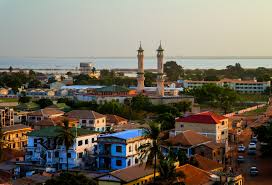Banjul, Gambia
🌅 Banjul, The Gambia: The Tiny Capital with a Giant Soul
Gateway to the River Gambia and West Africa’s warmest welcome
🗺️ Introduction
Banjul, the capital city of The Gambia, is a compact yet culturally rich port city located at the mouth of the mighty River Gambia. Though one of the smallest capitals in Africa, it packs a punch with colonial-era architecture, vibrant markets, and local life unfolding against the backdrop of palm-lined avenues and Atlantic breezes.
Surrounded by wetlands and close to sun-drenched beaches, Banjul is both a stepping stone and a destination in its own right for travelers craving authentic West African charm.
📸 Top Attractions & Things to Do
🏛️ Arch 22
A 35-meter-high monument commemorating the 1994 military coup. Climb to the top for panoramic views of the city, the Atlantic, and the River Gambia.
🛍️ Albert Market
The city’s busiest and most colorful market — perfect for hunting fabrics, spices, local crafts, and street food. Be prepared to haggle!
🕍 National Museum of The Gambia
Dive into Gambian history, archaeology, and ethnography. A good starting point to understand the colonial legacy and cultural diversity of the region.
🌅 River Gambia Viewpoint
Watch the life of the river unfold — with passing fishing boats, mangroves, and birdlife, it’s an ideal spot for photographers and sunset lovers.
🌴 Nature & Nearby Excursions
🐒 Abuko Nature Reserve
Just outside the city, this lush reserve is home to monkeys, antelope, crocodiles, and over 250 species of birds. A favorite for eco-tourists and nature lovers.
🐊 Kachikally Crocodile Pool (Bakau)
Located 30 minutes from Banjul, this sacred pool is inhabited by dozens of crocodiles, considered spiritually significant to locals. Some are tame enough to touch (with caution).
🏖️ Beaches in Bakau and Fajara
While Banjul itself isn’t a beach destination, nearby coastal towns like Bakau and Fajara (20–30 minutes away) offer golden sand and warm Atlantic surf.
🍛 Local Cuisine & Dining
Banjul’s food scene is flavorful and reflects West African traditions with colonial influences.
Must-Try Dishes:
-
Domoda – A delicious peanut-based stew with meat or fish.
-
Benachin (Jollof Rice) – A one-pot rice dish seasoned with tomato, vegetables, and spices.
-
Yassa Chicken – Marinated chicken in lemon-onion sauce.
-
Tapalapa Bread – Dense local bread, often served with beans or eggs.
Recommended Spots:
-
Domoda Delight (local favorite) – Home-style Gambian food.
-
Ali Baba’s Restaurant – Middle Eastern and Gambian fusion near the riverfront.
-
My Café (Fajara) – Western breakfast and great coffee just outside Banjul.
🏨 Where to Stay
While accommodation options in Banjul are limited, nearby beach resorts and guesthouses in Bakau and Serekunda provide more variety.
Top Picks:
-
Laico Atlantic Hotel – Located in Banjul itself, beachfront, and comfortable.
-
Ocean Bay Hotel (Bakau) – Great sea views and a pool.
-
African Heritage Guest House – Cozy and cultural stay with local flair.
🚍 Getting Around
-
Taxis are the most common form of transport and fairly inexpensive. Always agree on a price before the ride.
-
Minibuses (Gelle Gelle) are used by locals but can be confusing for tourists.
-
Walking around Banjul is safe and pleasant during daylight.
📅 Best Time to Visit
-
November to May (Dry Season): Sunny and comfortable. Ideal for beach trips and wildlife viewing.
-
June to October (Rainy Season): Lush landscapes but occasional heavy rains and humidity.
💡 Travel Tips
-
Currency: Gambian Dalasi (GMD)
-
Language: English is official. Mandinka, Wolof, and Fula widely spoken.
-
Health: Yellow Fever vaccination required. Drink bottled water.
-
Safety: Banjul is relatively safe; beware of pickpockets in crowded markets.
🧭 Cultural Etiquette
-
Dress modestly, especially in markets and rural areas.
-
Greet people with respect; handshakes are common, and greetings are very important in Gambian culture.
-
Tipping is appreciated but not required.
⭐ Travel Experience Rating:
| Category | Score / 10 | Highlights & Notes |
|---|---|---|
| Cultural Heritage | 8.0 | Strong local identity, historical sites, and friendly locals |
| Attractions | 7.0 | Limited number, but Arch 22 and the market are memorable |
| Natural Beauty | 8.5 | Access to reserves, mangroves, and river scenes |
| Cuisine | 8.0 | Delicious local dishes with unique Gambian flavors |
| Safety | 7.5 | Generally safe; just use street smarts |
| Affordability | 8.5 | Very budget-friendly for most travelers |
| Transport | 7.0 | Simple systems; mostly taxis |
| Cleanliness | 7.0 | City infrastructure is basic; some areas can feel rundown |


